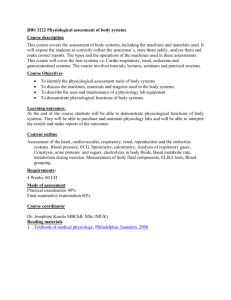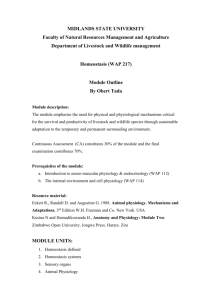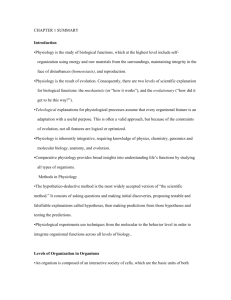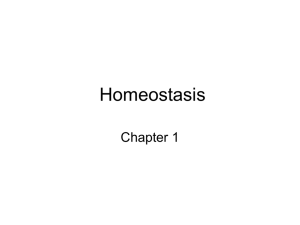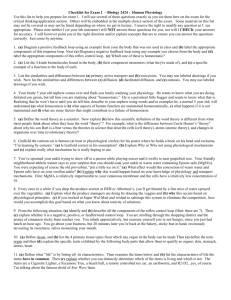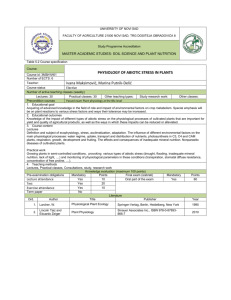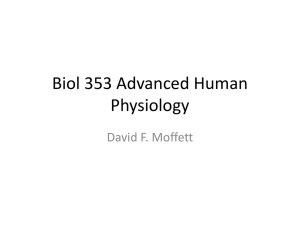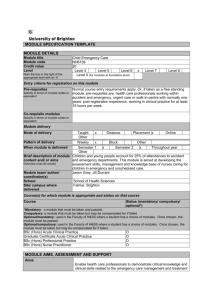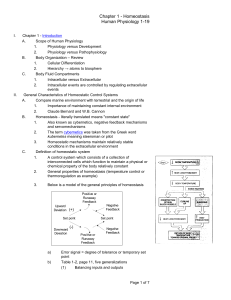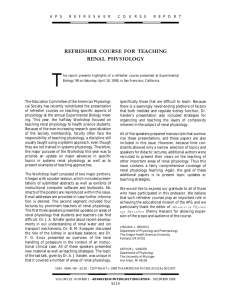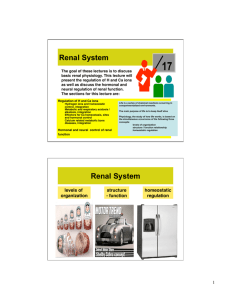BY206
advertisement
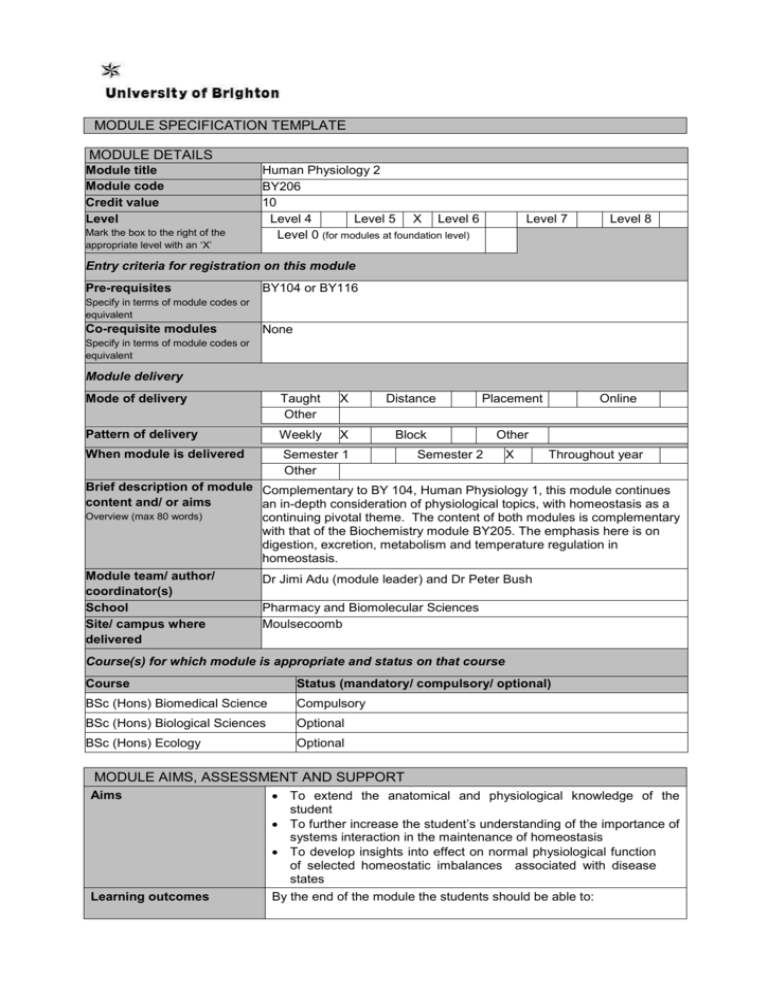
MODULE SPECIFICATION TEMPLATE MODULE DETAILS Module title Module code Credit value Level Mark the box to the right of the appropriate level with an ‘X’ Human Physiology 2 BY206 10 Level 4 Level 5 X Level 6 Level 0 (for modules at foundation level) Level 7 Level 8 Entry criteria for registration on this module Pre-requisites BY104 or BY116 Specify in terms of module codes or equivalent Co-requisite modules None Specify in terms of module codes or equivalent Module delivery Mode of delivery Taught Other X Distance Placement Pattern of delivery Weekly X Block Other When module is delivered Semester 1 Other Semester 2 X Online Throughout year Brief description of module Complementary to BY 104, Human Physiology 1, this module continues content and/ or aims an in-depth consideration of physiological topics, with homeostasis as a Overview (max 80 words) continuing pivotal theme. The content of both modules is complementary with that of the Biochemistry module BY205. The emphasis here is on digestion, excretion, metabolism and temperature regulation in homeostasis. Module team/ author/ coordinator(s) School Site/ campus where delivered Dr Jimi Adu (module leader) and Dr Peter Bush Pharmacy and Biomolecular Sciences Moulsecoomb Course(s) for which module is appropriate and status on that course Course Status (mandatory/ compulsory/ optional) BSc (Hons) Biomedical Science Compulsory BSc (Hons) Biological Sciences Optional BSc (Hons) Ecology Optional MODULE AIMS, ASSESSMENT AND SUPPORT Aims Learning outcomes To extend the anatomical and physiological knowledge of the student To further increase the student’s understanding of the importance of systems interaction in the maintenance of homeostasis To develop insights into effect on normal physiological function of selected homeostatic imbalances associated with disease states By the end of the module the students should be able to: LO1) describe in detail the anatomy and physiology of the digestive and excretory systems LO2) explain temperature regulation as an illustrative example of system interactions in homeostasi LO3) understand the concept of metabolic rate and factors affecting it LO4) understand the concepts of “balance” and body “pools” in homeostasis LO5) understand the effects of homeostatic disturbance on normal physiological function LO6) perform laboratory investigations into the regulation and role of selected physiological systems in homeostasis Content Learning support Regulation of water and electrolyte balance Renal processes for sodium, chloride and water, role of the renal tubules. Regulation of sodium excretion and extracellular volume, control of FR, control of reapsorption, aldosterone and the reninangiotensin system. Renal regulation of extracellular volume and the role of ADH, countercurrent multiplication and osmoreceptor control of ADH. Renal regulation of potassium. Calcium regulation and the role of the kidney. Hydrogen ion regulation, buffering and renal excretion. Pathophysiology of renal failure Regulation of digestion and absorption Basic principles, neural and hormonal regulation, phases of control; Gastric secretion and motility. Small intestine secretions and motility; Large intestine; Functions of the liver; Gall bladder and Pancreas; Other hepatic functions; regulation of blood glucose and homeostatic imbalances System interactions and homeostasis Thermoregulation; measurement of body temperature, interactions between cardiovascular and integumentary systems, routes of heat exchange, regulation of peripheral blood flow and sweating. Responses to exposure to heat and cold. Central control of body temperature and central and peripheral temperature receptors. The latest editions of: 1). Fox, S I., Human Physiology., McGraw-Hill 2).Widmaier, E.P., Raff, H., Strang, K.V.Vander’s Human Physiology: The Mechanisms of Body Function., McGraw-Hill 3). Guyton, A.C., and Hall, J.E. Textbook of Medical Physiology., Elsevier Teaching and learning activities The module will be delivered via lectures (approximately 36hrs), Details of teaching and practical work (2hrs), and assessment (2hrs). The students will be learning activities expected to undertake approximately 60hrs of personal study. Allocation of study hours (indicative) Study hours Where 10 credits = 100 learning hours SCHEDULED This is an indication of the number of hours students can expect to spend in scheduled teaching activities including lectures, seminars, tutorials, project supervision, demonstrations, practical classes and workshops, supervised time in workshops/ studios, fieldwork, external visits, and work-based learning. 40 GUIDED INDEPENDENT STUDY All students are expected to undertake guided independent study which includes wider reading/ practice, follow-up work, the completion of assessment tasks, and revisions. 60 PLACEMENT The placement is a specific type of learning away from the University that is not work-based learning or a year abroad. TOTAL STUDY HOURS Assessment tasks Details of assessment for Exam 50% (LO1 – LO4) 100 this module Types of assessment task1 Coursework 50% (one essay 25%[LO5] and one laboratory report 25%[LO6] % weighting (or indicate if component is pass/fail) Indicative list of summative assessment tasks which lead to the award of credit or which are required for progression. WRITTEN Written exam 50 COURSEWORK Written assignment/ essay, report, dissertation, portfolio, project output, set exercise 50 PRACTICAL Oral assessment and presentation, practical skills assessment, set exercise EXAMINATION INFORMATION Area examination board Biology and Biomedical Sciences External examiners Name Position and institution Date appointed Date tenure ends Mr G Knight Senior Lecturer, University of Portsmouth 01/10/10 30/09/15 QUALITY ASSURANCE Date of first approval 1991 Only complete where this is not the first version Date of last revision 2010 Only complete where this is not the first version Date of approval for this version 2013 Version number 5 Modules replaced Specify codes of modules for which this is a replacement Available as free-standing module? Yes No 1 Set exercises, which assess the application of knowledge or analytical, problem-solving or evaluative skills, are included under the type of assessment most appropriate to the particular task. X
